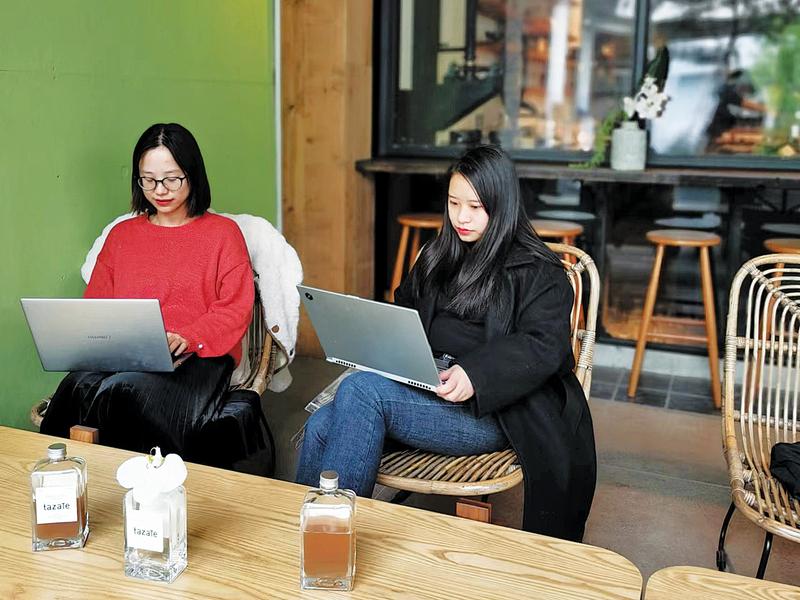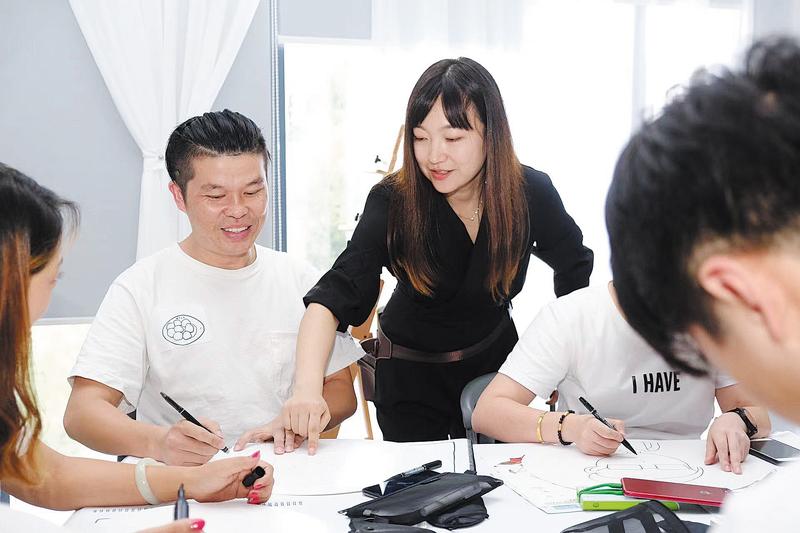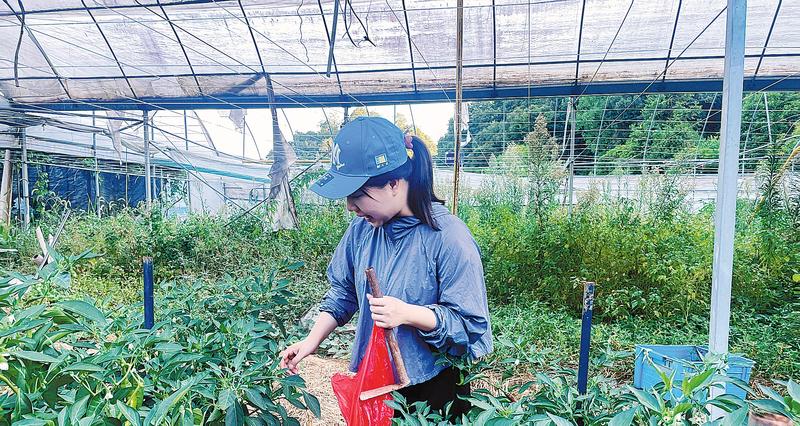Change of career paths brings challenges and rewards
 Tang Xue, 24, enjoys the open air on the farm she bought in Anji county, Zhejiang province, after resigning from jobs at three short-video companies. Tang saw the farm advertised online. (PHOTO PROVIDED TO CHINA DAILY)
Tang Xue, 24, enjoys the open air on the farm she bought in Anji county, Zhejiang province, after resigning from jobs at three short-video companies. Tang saw the farm advertised online. (PHOTO PROVIDED TO CHINA DAILY)
Many workers, especially the young, are opting to leave the traditional job market to pursue more flexible employment opportunities.
The majority of them do so after working for five to 10 years, according to a report released last year by Maimai, a social networking app for office employees, and iXigua Video, an online video service provider.
Although I am still busy with work all day, I enjoy the freedom and sense of fulfillment and achievement by being my own boss.
Shen Yiming, 28, who left his job in 2020after working in the tourism industry
Su Lan, a human resources director based in Hangzhou, Zhejiang province, said: "Young people nowadays have less financial pressure than those born in the 1970s and 1980s, as they grow up in a more open-minded society with more access to information. As a result, they have greater freedom to make their own decisions."
Countless people decide to change their career paths on impulse.
After breaking up with her boyfriend, Tang Xue, 24, resigned from her job six months ago to buy a farm in Anji county, Zhejiang.
"I believe it is important to do things on impulse sometimes, as I did earlier this year. I chose to take control of my own destiny without worrying about becoming trapped in a meaningless job," said Tang, who worked for short-video platforms at three companies in Hangzhou after graduating from a university in Hunan province in 2019.
Tang saw a farm in Jinhua, Zhejiang, advertised online, and was attracted by prospect of working in the open air, escaping stressful urban life, making new friends, and finding the ideal lifestyle.
 Lu Sina, 28, works as a voluntary teacher at a Chinese school in Thailand in 2018. (PHOTO PROVIDED TO CHINA DAILY)
Lu Sina, 28, works as a voluntary teacher at a Chinese school in Thailand in 2018. (PHOTO PROVIDED TO CHINA DAILY)
"I thought that changing the course of my life might pose a risk, but I was willing to take it. It is never too late to restart my career, as I am a smart person with excellent abilities," said Tang, who worked at the farm in Jinhua for a few months before buying her own in Anji earlier this year.
To realize her dream of buying a farm, she took an online training course on agricultural operations. Her small farm covers 1.3 hectares and boasts a 160-square-meter courtyard. She plans to run the farm as a "shared vegetable field" project, with customers ordering the produce she grows.
"It's good to see more people deciding to resign from their jobs, as this gives them increased freedom. Gradually transitioning from a stable job enables you to gain more experience and confidence, gradually find your real self, and take control of your life," Tang said.
She added that she will not be returning to the traditional job market.
According to a survey on "naked resignations" released last year by 51Job, one of the biggest human resource service companies in China, the two main reasons for such resignations are too much pressure and boring work. "Naked resignations" refer to people quitting their jobs without any backup plan, or without knowing where their next pay check is coming from.
Some 30 percent of the interviewees planning such resignations said they would save more than six months' salary before leaving their job without a future career plan.
 Lu and a friend work at a cafe in Chengdu, Sichuan province, in March. (PHOTO PROVIDED TO CHINA DAILY)
Lu and a friend work at a cafe in Chengdu, Sichuan province, in March. (PHOTO PROVIDED TO CHINA DAILY)
Heavy schedule
Shen Yiming, 28, who left his job in 2020 after working in the tourism industry for more than three years, decided to take a break from the high-pressure work and uncertain career prospects.
"Although I made more than 30,000 yuan ($4,254) a month if I performed well, I failed to see a future for myself, as I was swamped by work all day long. My income also fell sharply due to a slowdown in the industry," said Shen, who worked as a travel consultant in Hangzhou after graduating from Jiaxing University in 2017.
Initially, he devoted himself fully to his work, becoming the leading consultant in his department due to his ability to draw up popular travel plans. However, the relentless high-pressure work schedules forced Shen to rethink his career.
He decided to do something he enjoyed. As he was fond of traveling and writing travel blogs in his spare time, Shen spent 12 months journeying throughout China last year on his savings, while continuing to earn money by working on cultural and tourism projects as a freelancer.
"I always bear in mind that if I run out of money, or if things don't go as planned, I still have the ability to find a job again and become one of the best-performing employees in the sector," he said.
 Lu (right) and her mother toast each other in Dali, Yunnan province, in June. (PHOTO PROVIDED TO CHINA DAILY)
Lu (right) and her mother toast each other in Dali, Yunnan province, in June. (PHOTO PROVIDED TO CHINA DAILY)
Shen's self-confidence was rewarded when he was contacted by several brands to promote products in his travel blogs of his nationwide travels, during which he was posting photos of his destinations online.
"I don't think it is all about luck. I have been rewarded for my persistence over the years. I constantly post my travel blogs with eye-catching photos and other content. In this way, I give myself work and a promising future," Shen said.
At the end of last year, he created an account on Xiaohongshu, a life-sharing platform, and now has more than 300,000 followers for his travel blogs.
Shen, who aims to attract up to 800,000 followers within two years, is now focusing more on promoting brands for reliable clients. He takes photos and shoots videos, including those of products in stunning scenery. He also tries to find the best way to integrate products with his work, rather than blindly advertising them.
The number of monthly orders placed by Shen's clients has risen from about 10 in May to 30, and he is earning about 100,000 yuan per month.
"Although I am still busy with work all day, I enjoy the freedom and sense of fulfillment and achievement by being my own boss. I do whatever I like and also make money at the same time," he said.
 Shen Yiming, 28, celebrates the start of 2020 by climbing a volcano in Indonesia. (PHOTO PROVIDED TO CHINA DAILY)
Shen Yiming, 28, celebrates the start of 2020 by climbing a volcano in Indonesia. (PHOTO PROVIDED TO CHINA DAILY)
Greater tolerance
As employees' attitudes toward work change, along with increasingly diversified employment methods in different industries, new forms of flexible employment are emerging.
Workers want flexibility in where, when and how they are employed. Since 2019, there has been an 83 percent rise in the number of job posts mentioning "flexibility", according to LinkedIn's Global Talent Trends Report issued in January. On individual companies' LinkedIn profiles, references to "flexibility" in posts rose by 343 percent over the same period.
Yu Hai, a sociology professor at Fudan University in Shanghai, said, "Traditional forms of employment have diversified in these fast-changing times, while society is showing greater tolerance for newly emerging occupations."
According to latest data from the National Bureau of Statistics, by the end of last year, the number of workers in flexible employment in China reached 200 million — more than 1.6 million of them in livestreaming and other forms of new media, nearly a threefold year-on-year rise.
Rather than joining a company and leaving after several years, some college graduates choose a different course of action — including Lu Sina, 28, who works and lives in Hangzhou.
Lu launched a travel agency with a friend after graduating from Sichuan Conservatory of Music in 2016 with a major in culture industry management.
Short of social experience and long-range planning, Lu found running the small business too difficult and exhausting. After leaving the agency in 2018, she worked as a curatorial assistant in Guangzhou, capital of Guangdong province. She was also employed as a part-time butler at an inn in Moganshan, a scenic area in Zhejiang, and did a variety of other jobs.
Lu then became a voluntary teacher at a Chinese school in Thailand.
"Living in Thailand made me rethink my life and realize that I had to regain the passion for work," she said.
 Lin Xiaobai (center) teaches beginners to draw at a workshop in Suzhou, Jiangsu province, in 2019. (PHOTO PROVIDED TO CHINA DAILY)
Lin Xiaobai (center) teaches beginners to draw at a workshop in Suzhou, Jiangsu province, in 2019. (PHOTO PROVIDED TO CHINA DAILY)
During her time in Thailand, she took daytime online courses in business operations and gave Chinese lessons to children in the evening. Lu also earned 2,000 to 10,000 yuan a month from time to time as a freelance travel adviser.
However, she started to worry when she saw her former university classmates being promoted, earning high salaries, buying property, and getting married.
As a result, Lu obtained a professional certificate to operate new media — receiving 10 job offers after applying for 20 positions within two weeks.
Armed with what she learned from the courses and voluntary work, she returned to Hangzhou in 2019 to work as operations supervisor at a domestic maternal and infant products brand.
However, after working at the company for two years, she decided to pursue flexible employment again — this time making detailed plans and preparing about nine months in advance.
"I kept asking myself what I would do for a living without relying on any particular company. I eventually decided I wanted to be an operations consultant offering professional advice on product operation and promotion," Lu said.
She started taking courses on operations consulting in September last year, and resigned from the company in March with 300,000 yuan in her savings account.
To be self-disciplined while working on her own, Lu carefully plans her daily schedule. "I want to manage myself as a company," she said.
Lu currently works three days a week as an independent operations consultant and career planner, earning 15,000 yuan a month on average.
As an operations consultant for two enterprises, she offers advice on producing goods to attract more consumers. She also counsels four individuals on promoting themselves on new media platforms.
 Tang Xue works at a farm in Jinhua, Zhejiang, in August before buying her own farm in Anji. (PHOTO PROVIDED TO CHINA DAILY)
Tang Xue works at a farm in Jinhua, Zhejiang, in August before buying her own farm in Anji. (PHOTO PROVIDED TO CHINA DAILY)
Tough prospects
Lin Xiaobai, 36, from Chengdu, capital of Sichuan province, majored in business administration at Chengdu University, graduating in 2008. She then worked in human resources for a company in Chengdu, at a trading company in Shanghai, at a property agency and other companies in Suzhou, Jiangsu province, and finally at a bank in Nanchong, Sichuan, before deciding to leave the latter position in 2014.
"A few months after I started working at the bank, I realized it was not the life for me. I wanted to quit this boring and stressful work, even though I was earning a good salary," said Lin, who went through an unhappy divorce during this period.
She tried launching a creative design space selling collectibles in Suzhou in 2014, and also a studio in Sichuan for children to learn to draw, sew, and make handicrafts and clay figures. She also launched a creative talent education program with a partner. All these projects failed, as Lin kept losing money and incurring debts.
At the time, she described herself as a person full of ideological thoughts, but without any business plan or management experience.
"Working on your own requires an extremely strong mind. You have to break out of your comfort zone, challenge the limit of your potential, and have the strength to make many risky decisions," said Lin, who has learned to be independent as a single mother and an entrepreneur.
She eventually drew inspiration from her interest in drawing, which she acquired a number of years ago.
Lin, who draws stick figures to express her feelings and views of daily life, has more than 400,000 followers on Xiaohongshu, and regularly cooperates with corporate brands.
In 2020, she launched online training courses to teach beginners to record their daily lives through drawing, attracting 1,000 participants.
"Drawing without constraints enables us to lead a positive and healthier life with enthusiasm and passion, as well as changing our beliefs and attitude toward life," she said.
Lin now begins each day with one hour of exercise followed by four hours of work.
Yu, the sociology professor, said: "People often decide to leave the traditional job market without planning their next move. This change in working patterns among the younger generation is irreversible and will have a profound impact on flexible employment in the future."
Contact the writer at sunnyu923@163.com


